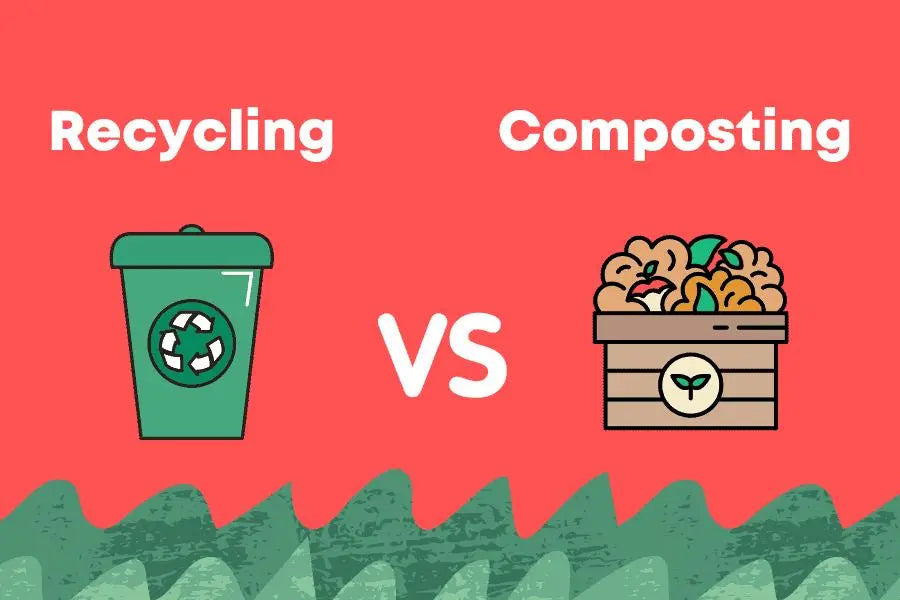In the face of growing environmental concerns, the importance of sustainable waste management practices cannot be overstated. When it comes to dealing with packaging materials, two commonly used methods are recycling and composting. While both have their merits, this blog post aims to highlight why recycling packaging materials is often the better choice when it comes to sustainability and environmental impact.
Reduced Resource Consumption
Recycling packaging materials, such as plastic, paper, and glass, conserves valuable resources. These materials require significant energy and resources to manufacture in the first place. By recycling, we extend the lifespan of these materials, reducing the need for new resources and energy to produce replacement items. Composting, on the other hand, is not as effective in conserving these valuable resources, as organic matter is relatively abundant and biodegradable.
Energy Savings
Recycling packaging materials is more energy-efficient than composting. The recycling process typically requires less energy than composting, which often involves transportation, shredding, and the management of organic matter. Recycling involves melting, crushing, or reprocessing materials, which, in many cases, consumes less energy than the composting process. Reduced energy consumption contributes to lower greenhouse gas emissions, making recycling a better choice for combatting climate change.
Mitigating Pollution
When packaging materials are improperly disposed of in landfills, they can pose a risk to the environment. Many packaging materials, such as plastics, can take hundreds of years to break down, releasing harmful chemicals and microplastics in the process. Composting, while beneficial for organic waste, does little to mitigate the pollution associated with non-biodegradable materials. Recycling diverts these materials from landfills, reducing the potential for long-term environmental contamination.
Preserving Wildlife and Ecosystems
Recycling plays a significant role in protecting wildlife and ecosystems. Landfills can leak toxins and pollutants into the environment, harming local wildlife and ecosystems. By choosing recycling over composting for packaging materials, we can help reduce the harmful impacts on these precious natural habitats. Composting, while excellent for organic waste, does not address the negative environmental consequences associated with non-biodegradable materials.
Promoting a Circular Economy
Recycling supports the concept of a circular economy, where resources are continually reused and recycled. This approach reduces waste and lessens the strain on our planet's resources. Composting is part of a linear process, as organic matter breaks down and is lost from the production cycle. Recycling packaging materials encourages manufacturers to incorporate recycled materials into new products, thus reducing the demand for raw materials and fostering a more sustainable economy.
Job Creation
Recycling packaging materials also has economic benefits. It generates jobs in the recycling industry, from collection and sorting to processing and manufacturing. This job creation contributes to local and national economies while helping to build a more sustainable future. Composting, while a valuable practice, does not create as many jobs or stimulate economic growth to the same extent as recycling.
Lower Transportation Costs
Recycling typically requires shorter transportation distances compared to composting. Packaging materials are collected and processed at recycling facilities within relatively close proximity, reducing the environmental impact associated with transportation. Composting often involves the collection of organic matter from various sources and its transportation to composting sites, which can be much farther away. Reducing transportation distances is essential in minimizing carbon emissions and supporting sustainable waste management.
Conclusion
While composting is an essential practice for managing organic waste, recycling packaging materials often offers a more comprehensive and sustainable approach to waste management. Recycling conserves resources, saves energy, mitigates pollution, preserves wildlife and ecosystems, promotes a circular economy, creates jobs, and lowers transportation costs. These advantages make recycling a better choice when it comes to reducing our environmental impact and building a more sustainable future. By choosing recycling over composting for packaging materials, we can play a crucial role in protecting our planet for future generations.
Not just Recyclable but Carbon-neutral too
Our Colompac self-sealing cardboard boxes not only are 100% recyclable but they can also be reused up to 20 times, creating new paper products without significant material loss. This innovative feature highlights the sustainability of our packaging solutions, aligning perfectly with the principles of recycling and resource conservation.
Furthermore, we take pride in offering carbon-neutral products across our entire Colompac range. By selecting our packaging materials, you're making an eco-conscious choice that actively contributes to reducing carbon emissions and combating climate change. We are committed to making a positive impact on the environment, and our carbon-neutral products are a testament to that commitment.
If you're eager to decrease your carbon footprint and make a positive contribution to a greener, more sustainable future, we invite you to get in touch with us. Send us an inquiry at mates@packagemate.com.au, and we'll be more than happy to assist you in finding the right packaging solutions that not only meet your needs but also align with your environmental values.
By choosing sustainable, recyclable, and carbon-neutral packaging options, you're not just making a responsible business decision – you're also contributing to a healthier planet for future generations. Together, we can make a significant difference in reducing the environmental impact of packaging materials. Join us in the journey towards a more sustainable and eco-friendly world.

